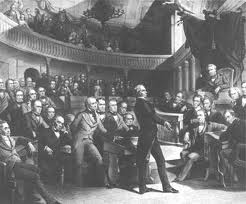(Rating 4 of 5)
Martin Van Buren is the first President of the United States
to be born an American citizen. As a
natural born American he had a different view of his country than many of his
predecessors. This was a view of America
from the ground up. He saw the country
as it was not what the makers wanted to be.
Van Buren was not afraid of the concept of popular democratic
participation and, in fact, embraced it.
He was our first president who was a natural politician.
“To the Van Burnenites, on the other hand, political parties were not threatening to the American nation. They did not corrupt society or its politics. Contrary to established belief, they were necessary, proper, and, in fact, a positive good in the existing political environment.” (p.26)
 |
| Van Buren on the road to power |
 |
| President Jackson's Van Buren's strongest ally |
Van Buren
emerges as the political mastermind of the Jacksonian movement, leading a
relentless campaign against John Quincy Adams. Jackson would emerge as the
winner in the election of 1828. Van
Buren was persuaded to resign his recently elected position as Governor of New York in order to become the
U.S. Secretary of State. Rising up through
the Jackson Administration he displaces Calhoun as Vice President at the first
ever Democratic National Convention in 1832.
In 1836, he is elected to replace Jackson.
From there
everything goes downhill. The economics policies of the Jackson Administration
helped usher in an economic depression that severely hurt Van Buren’s
reelection chances. In fact it could be
argued that President Van Buren was the first president ever to be denied re-election due to economic circumstances. Van Buren was an architect of Democratic Party populism. The same methods Van Buren used to get Jackson and himself elected President were also used to undermine his presidency. The tactics that the Democrats used to dislodge John Quincy Adams from the White House were turned on him. The Whigs had their own popular military hero from the War of 1812, William Henry Harrison, and were able to portray Van Buren as an out of touch elitist. That was the same strategy the Democrats used against Adams in favor of Jackson, but this time Martin Van Buren was the target.
 |
| William Henry Harrison, Van Buren's opponent in both 1836 and 1840 |
The
election of 1840 was not the last time Van Buren’s own ideas came back to haunt
him. In 1832 the first Democratic
National Convention issued a two-thirds rule requiring that a candidate to be nominated only if he had two-thirds of the delegates[1]. This was great for Van Buren in 1832, 1836,
and 1840 where the President enjoyed clear support all over the party. In 1844 however the former President could
only muster a majority of the delegates.
In addition, his agreement with Henry Clay to keep Texas out of the
national political conversation opened up Van Buren and Henry Clay to being
part of a corrupt bargain, the second of Clay’s career. Van Buren had been one of the people to
accuse Clay and Adams of the first one in 1824, now Van Buren was on the other
side of the coin. That made it impossible to win any more support and worse
it cost him Andrew Jackson’s. With only
a majority of the delegates and too many hardliners against him, the nomination went
to James K. Polk of Tennessee. As the
first former president to attempt to regain the office, his efforts ended in failure[2].
Van Buren ran again in 1848 shocking everyone when the preacher of party discipline bolted from his party to the free-soil party. He would be the first of three presidents to attempt a comeback in this manner. It stood no chance but Van Buren got his revenge at the Democrats, who in his mind betrayed him, by throwing the election to the Whigs, electing Zachary Taylor over Lewis Cass.
Joel Silbey’s book is small and easy to read. It is a good starting point for anyone who would like to know something about our eighth president. Van Buren was quite a trailblazer but every new political weapon he could find was then used against him. He in many ways was his own worst enemy.






















